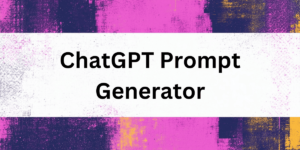On November 30, 2022, OpenAI came up with an innovative artificial intelligence chatbot named ChatGPT, or Chat Generative Pre-trained Transformer. With all the bells and whistles, the ingenious chatbot gave rise to talk in Silicon Valley. It was also rumored to have obtained a pretty penny — for example, an investment from Microsoft to the tune of 10 billion dollars.
ChatGPT has piqued the curiosity of users with its out-of-the-box mission to assist people with almost everything, from daily work tasks and answering questions to making jokes and offering friendly advice. The AI chatbot has the ability to help you gather insights and guidance from different business niches and spheres.
Digital marketing and SEO also have uses for ChatGPT. A clever chatbot can help develop marketing strategies, produce epic content ideas, streamline keyword research, and more. This article explains how to use ChatGPT for SEO purposes. You will learn how to facilitate your SEO duties, get new optimization concepts, and unlock your creativity with this young yet powerful AI chatbot.
Lucrative Methods to Use ChatGPT for SEO
SEO optimization contains a myriad of aspects to consider when building an SEO strategy for a niche business. And ChatGPT prompts you with relevant solutions and suggestions to incorporate into the action plan. You feed the chatbot your query, concern, topic, or situation, and it helps you out, just like Google.
Although it is possible to refine your SEO with ChatGPT, and the tool can certainly generate good ideas for your search engine optimization efforts, keep in mind that ChatGPT only operates online data as far back as September 2021, which is its knowledge cutoff. So, make sure to analyze its recommendations precisely and stay abreast of SEO industry updates.
1. Streamline Link Building
Building relevant and high-quality links is an essential SEO tactic that allows you to grow your website’s reputation and expand the domain’s authority. And truth be told, links and the acquired link juice signal to Google that a website is reliable and worthy of being cited and showcased in search results. For this reason, websites with vigorous backlink profiles get better rankings and more organic traffic.
ChatGPT for SEO link building allows you to streamline your duties and tasks. However, as the chatbot’s training data doesn’t cover information after 2021, Google can penalize you for using obsolete data.
Moreover, overlooking the changeability of domain quality and acquiring backlinks from domains lacking trust and authority can significantly harm your entire link-building strategy. Therefore, you need up-to-date professional tools like the backlink checker from SE Ranking to estimate backlink key metrics and investigate competitors’ backlink profiles. It provides detailed information on the quality and quantity of links, their types, area of distribution, referring domains, anchors, and more.

Yet ChatGPT can help you automate the process of finding emails for outreach. Having data on first and last names, URLs, and domains of representatives to contact is not enough, as you need to collect their emails to get started with your link-building campaign. Therefore, to skip everlasting one-by-one email collection, you can ask ChatGPT to generate a relevant code for further use with a suitable email-finding API.
Moreover, ChatGPT SEO prompts you to facilitate outreach email creation. To make your emails stand out and gain responses, you should be creative and know the content requirements and the person you need to reach. Nevertheless, you can use the email example provided by the AI chatbot as a template and personalize it according to your needs. For example, here is a part of ChatGPT’s outreach email suggestion for SEO link-building purposes.

Additionally, you can use ChatGPT to simplify and speed up the process of chasing popular niche-related websites, preparing compelling topic examples, emphasizing your opinions on several matters, and implementing the necessary keywords into the content examples you provide.
2. Facilitate Keyword Research
Keywords are niche-related words or phrases users type in search engines to acquire information relevant to their search intent. All keywords have particular qualities, such as keyword search volume, which indicates the number of searches for a specific keyword in a given timeframe, and keyword competition, which shows how difficult it is to rank for a certain keyword in search results.
Meanwhile, the search intent, or user intent, refers to the user’s primary goal when searching for a particular topic, product, service, etc. There are four main types of search intent: informational, navigational, transactional, and commercial.
And truthfully, each of them is essential, as meeting the search intent of your potential customer directly impacts your business development and authority in your field. Furthermore, it also affects your online performance. If you create content chaotically, ignoring the user search intent, instead of valuable rankings and organic traffic you will acquire a high bounce rate.
Although conducting keyword research, analyzing competitors’ keywords, and performing any other in-depth keyword examination should be delegated to dedicated SEO optimization tools, ChatGPT can still help adjust and facilitate working with keywords.
Thus, you can ask ChatGPT to classify keywords based on their search intent, group keywords based on their semantic relevance, suggest a list of popular questions and keywords related to the particular search query, and highlight keywords in text content in bold.
ChatGPT for SEO keywords workflow can also provide lucrative long-tail keywords for your key phrase to obtain more profound keyword variations featuring low competition. Check out the example below.

3. Come Up with Titles and Meta Descriptions
Titles and meta descriptions briefly showcase your page content to users and search engines. Therefore, you need to go the extra mile to ensure your website pages boast unique, SEO-friendly, and captivating titles and descriptions that encourage users to click and explore the content and help search engines understand what your pages are about. If you run out of ideas, consider using ChatGPT.
ChatGPT prompts to generate accurate page titles and meta descriptions for your landing pages, blog posts, product pages, and more. Just don’t copy and paste the exact chatbot’s suggestions, as each of them requires your personal touch and adjustment to meet the tone and voice of your brand. Furthermore, remember to enrich the title and description examples with your target keywords.

4. Improve and Optimize Content
Writing killer evergreen content requires precise time and energy management. You should be in the mood, have inspiration and expertise, along with some incredible content ideas, research statistics and analytics, think about examples to use in the post or article, etc. And it can all be overwhelming if you work with SEO content daily or manage a hub website constantly demanding new themes and topics to uncover.
Utilizing ChatGPT contributes to simplifying content creation, as the chatbot can efficiently perform numerous tasks devoted to writing, editing, paraphrasing academic and business content, etc. For this reason, ChatGPT is banned from New York City public school devices and networks to prevent cheating and the decline of critical thinking and problem-solving skills.
You can ask ChatGPT to provide some content ideas for particular key phrases, generate catchy quotes to captivate readers, and create an outline for a future article on a given topic. For example, see ChatGPT’s article outline clarifying gardening tips for beginners. Looks good, right?

ChatGPT for content writing also can lend a helping hand if you need to find and fix grammar issues to improve content clarity, correctness, delivery, and engagement. Furthermore, the chatbot can assist you in enhancing the text with strong and effective CTAs, rephrasing the content to make it communicate to your buyer persona, and even rewriting the text with the SEO keywords you provide.
However, remember that ChatGPT for SEO content creation needs to be used wisely, as the chatbot provides results based on analyzing existing content all over the web, so it comes up with plagiarized content that lacks originality. ChatGPT is artificial intelligence, so its recommendations may need to be revised in competency and experience. Using its content offers as is, you may break the Google E-E-A-T guidelines, referring to Experience, Expertise, Authoritativeness, and Trustworthiness, and terminate your content success in Google Search.
5. Generate Structured Data for Your Content
Structured data or schema markup is the best and most reliable way to represent the information on your website to search engines. Although structured data is not a Google ranking factor, it is an essential SEO tactic that helps search engines understand page content during crawling, supplements your E-E-A-T efforts, and contributes to acquiring rich results and improving overall website online visibility.
Additionally, structured data’s accuracy defines how your content snippets will look in search results. So striving for neat and up-to-date structured data markup can also help you provide your potential customers with more specific information about your products and services.
Using an AI chatbot to generate schema markup for your data is somewhat of a shortcut that facilitates the legwork. ChatGPT prompts you to forge the code to help you organize different data on your site, depending on its type and purpose. To illustrate, let’s ask ChatGPT to generate schema markup for the product page.

The result looks pretty good and even has a forewarning to replace the image value with the product image’s URL or file path. Nevertheless, before adding it to your website, you need to double-check the code you obtain from ChatGPT via dedicated tools like Rich Results Test or Schema Markup Validator. Otherwise, it may harm your online performance and rankings.
6. Create Rules for Robots.txt File
The robots.txt is a text file guiding search engine robots and spiders on what pages to crawl or omit on the website. Every website needs a valid robвots.txt file with correct recommendations of rules and restrictions for web-crawling software. But if you have no idea how to write rules for robots and block some site pages from crawling, you can employ ChatGPT for SEO to help you understand the nuts and bolts.
To give you an example, let’s use ChatGPT to create robots.txt rules for blocking Google and Bing from crawling copyrighted images on the website.

Remember to check the rules precisely before adding them to your robots.txt file and test your robots.txt to eliminate syntax warnings and logic errors, as even the most powerful and competent AI chatbot can come up with irrelevant data containing errors.
7. Generate Static XML Sitemap
Sitemaps are crucial for SEO optimization as they enable search engines to identify, crawl, and index pages on the website, and understand videos, images, and other site files and the relationships between them. Static XML sitemaps are by far the most basic sitemap type used for websites, regardless of their size or niche.
ChatGPT prompts to help you generate a valid XML sitemap for the website in no time. You just need to specify the URLs to include in your website sitemap file.

Although you can delegate sitemap creation to ChatGPT, never copy and paste the received information without thorough examination. Also, consider managing your sitemap using the Sitemap Report or Google Search Console API.
8. Create Regex Patterns for Google Search Console
Regular expressions or regex refer to the pattern-matching syntax you can implement to advance your search for complex strings. Thus, when investigating different search queries and site performance data in Google Search Console or Google Analytics, you can utilize regex to filter and sort all the essentials and obtain relevant data to enhance your rankings.
For example, let’s ask ChatGPT to generate a regex to show matches containing any of the following words as the first word in the match: “how”, “what”, and “why”. Below you can see the output from ChatGPT.

You can now utilize the generated regular expression to filter the search queries in the Search Console and discover pages with essential keywords to improve your organic positions in SERPs.
Key Points to Take Away
Indeed, ChatGPT is a high-end AI chatbot offering solutions to different concerns, providing advice, assisting in various tasks, and simply allowing you to dilute the routine with a pleasant conversation on a particular topic.
Employing ChatGPT for SEO saves time and resources and facilitates brainstorming. You can use ChatGPT for content writing and editing, keyword selection, backlinking strategy improvement, technical SEO adjustments, and more. However, bear in mind that no AI solution can fully replace human creativity and expertise, so consider utilizing the chatbot as a comprehensive draft for your precise investigation and customization.
Author BIO:
Leslie Anglesey is a freelance writer, journalist, and author of various articles with a passion for telling stories about the economic and social situation in the world. In case of any inquiries or suggestions kindly reach out to her at GuestPostingNinja@gmail.com.




















